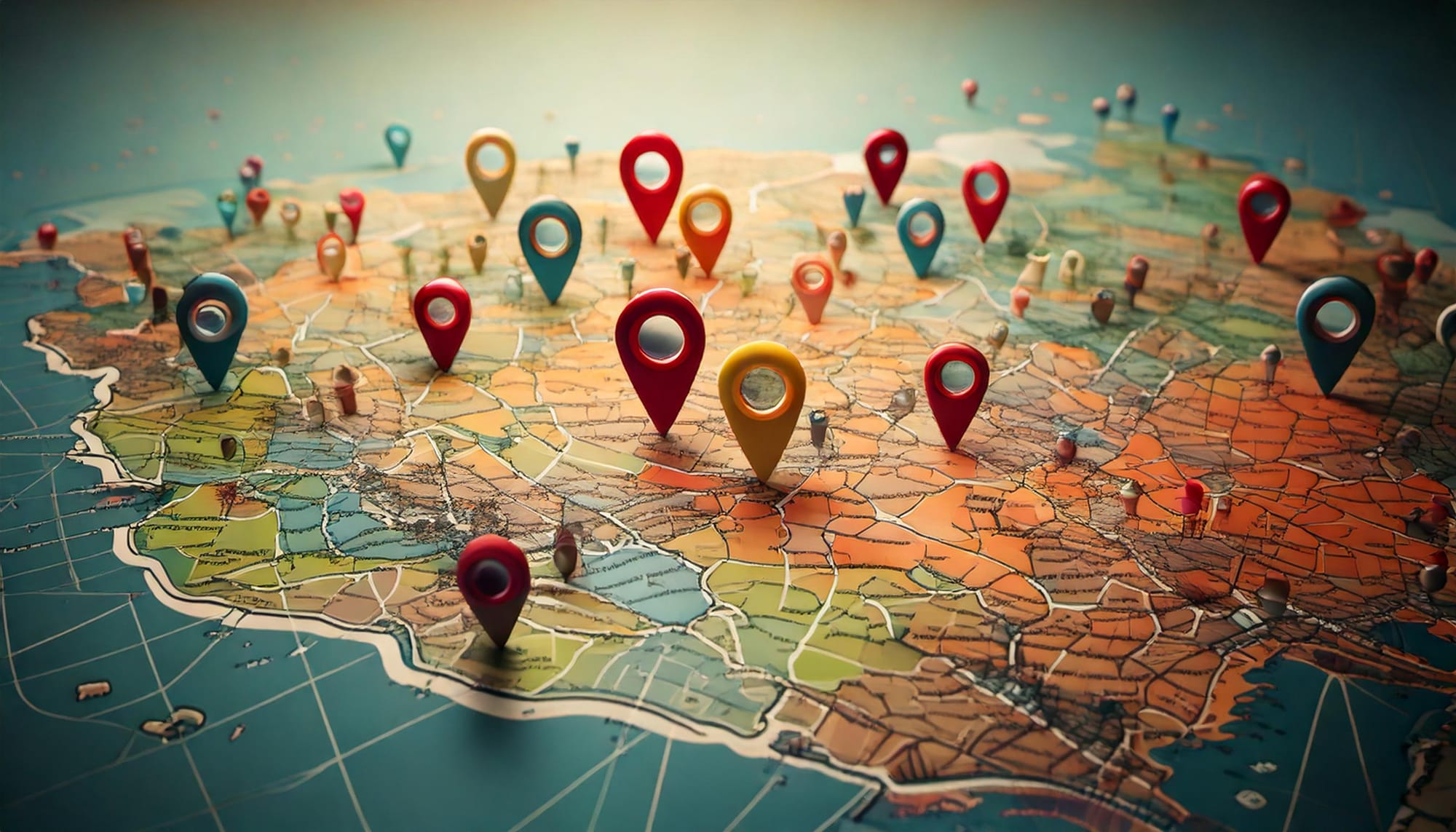What does Overture Maps mean for OpenStreetMap and the future of open source mapping?

As the world becomes increasingly dependent on accurate, accessible maps, the competition and collaboration among mapping projects is evolving, bringing both challenges and opportunities to the community.
OpenStreetMap (OSM) has long been a shining example of open-source mapping, where contributors from all backgrounds work together to build a comprehensive, unbiased global map. Recently, however, a new corporate-backed project called Overture Maps has entered the scene, prompting discussions on how its presence could affect OSM and the broader open-source mapping ecosystem.
In this article, we thought we'd explore the potential impacts of Overture Maps on the OSM community, the ethical and practical concerns surrounding this development, and the opportunities and challenges this may bring for all of us – including Jawg Maps – who rely on open data.
A bit of background
For nearly two decades, OpenStreetMap has been the cornerstone of open-source mapping, offering a freely accessible, community-driven platform where thousands of volunteers contribute to building and refining map data. It’s not just a map but a movement—a commitment to openness, accuracy, and neutrality that has earned OSM its loyal community and widespread adoption by businesses, governments, and individuals alike.
Overture Maps, on the other hand, brings a corporate-backed alternative to the table. Supported by industry giants like Meta, Microsoft, Amazon, and TomTom, Overture Maps is positioned to leverage vast resources and advanced technology to streamline data collection and processing. While the project aims to address fragmentation and data inconsistency — goals we can all support — it also raises questions about the future of OSM and the broader open-source mapping landscape.
The potential risks posed by Overture Maps
Corporate influence on open data
One of the primary concerns surrounding Overture Maps is the influence that large corporations could have on an open-source mapping project. With companies like Meta and Microsoft involved, some fear that Overture Maps may prioritize corporate interests over community values, potentially leading to commercially-driven biases in map data. This shift could contradict the neutrality that OSM has worked so hard to maintain, introducing new risks to the integrity of open-source maps.
Plus, the sheer power and reach of these corporations could create an imbalance within the open-source mapping ecosystem. If Overture Maps overshadows community-led efforts, it may gradually erode the decentralized nature of OSM, where decisions are made collaboratively without a profit-driven agenda.
Data ownership and licensing
There are also questions about data ownership and licensing compatibility. OpenStreetMap operates under the Open Database License (ODbL), ensuring that its data remains freely accessible while requiring attribution and sharing under the same license. However, concerns have been raised about how Overture Maps will handle OSM data within this framework, particularly if proprietary elements are introduced that restrict parts of the data under more limiting terms.
Ethics around data attribution also play a critical role in the discussion. OSM’s vast and detailed map data exists solely because of the dedication of countless volunteers who have spent years curating, editing, and refining every element. These contributors often work for the sake of open data accessibility, with no financial gain or incentive other than a commitment to shared knowledge. However, if Overture Maps utilizes OSM data without providing full, visible attribution, it risks not only demoralizing these volunteers but also potentially devaluing their contributions.
Furthermore, corporate-backed projects can often attract more funding and resources, which may reduce financial support for independent initiatives like OSM. This shift could hinder OSM’s ability to sustain and grow, limiting opportunities for innovation and development.
Concerns over data usage
One significant concern revolves around how Overture Maps might handle the data contributed by OpenStreetMap volunteers. For many contributors, the open-source ethos and non-commercial nature of OSM are fundamental to their participation. The prospect of their work being used for corporate purposes, such as in FAANG applications, conflicts with these values and may provoke backlash.
Contributors could advocate for stricter licensing, potentially hardening the Open Database License (ODbL) to limit commercial use without community consent. This tension underscores the need for transparency and trust in corporate use of OSM data to maintain the balance between openness and the community's intent.
Long-term consequences for the mapping ecosystem
Risk of monopolization
If Overture Maps gains widespread adoption, there’s a real risk of it monopolizing the digital mapping space, stifling smaller initiatives and reducing the diversity of options available. A single-source dominance could discourage innovation, leaving users with fewer choices and a less resilient mapping ecosystem.
Reduced transparency
Another potential risk lies in transparency. In a community-driven project like OSM, data curation and decision-making are visible to all. However, as a corporate-driven project, Overture Maps may not offer the same level of transparency in data decisions, which could limit the community’s ability to ensure neutrality and integrity in the data.
For example, corporate influence could lead to decisions like adjusting disputed country borders without community input, potentially aligning the data with specific political or commercial interests rather than maintaining an unbiased perspective.
The potential benefits of Overture Maps
While the concerns are significant, there are also some potential benefits to Overture Maps that can’t be overlooked. For instance, by addressing data fragmentation and inconsistencies, Overture Maps may improve data quality and make it more accessible for a wider range of applications. The project’s advanced resources could also accelerate technological advancements in mapping, potentially benefiting the broader ecosystem.
There is even room for collaboration. If managed thoughtfully, Overture Maps could collaborate with OSM in ways that help both projects grow, leveraging corporate resources to support open-source goals and enhance the quality of map data available to all.
Why OpenStreetMap still matters
Despite the potential benefits that Overture Maps may bring, OpenStreetMap continues to hold unique value. As a community-driven platform, OSM offers transparency, ethical data usage, and the flexibility to adapt to the needs of its contributors and users. Its commitment to neutrality and openness means that users can trust the data they’re using without worrying about hidden agendas or commercial interests.
The community-driven strength of OSM fosters a collaborative, transparent mapping model, which is more than just a dataset; it’s a representation of shared values and ethical data usage that prioritize user privacy and accessibility.
Supporting OpenStreetMap for a balanced ecosystem
For those who value open-source mapping, supporting OpenStreetMap remains critical. By contributing to or advocating for OSM, we can help ensure that a balanced ecosystem persists — one that values transparency, neutrality, and ethical data usage. Both corporate-backed and community-driven projects have roles to play, but maintaining a resilient, diverse mapping landscape means upholding the unique contributions that OSM provides.
Final thoughts (and looking ahead)
For Jawg Maps, Overture Maps impacts the open-source ecosystem we rely on, potentially altering data availability and flexibility. Our commitment remains to support OSM and open-source values, encouraging our users to contribute and engage. But together, we can support initiatives like OSM while remaining open to beneficial collaborations that enhance accessible, accurate map data.
In the end, a balanced approach — one that respects both innovation and integrity — will allow us to build a stronger, more inclusive mapping ecosystem for all 🗺️

